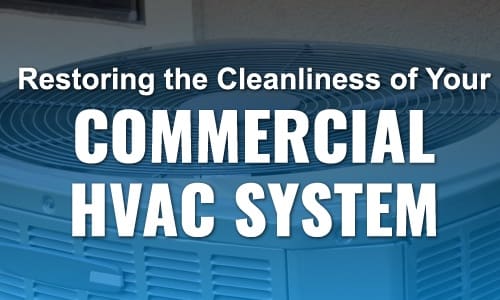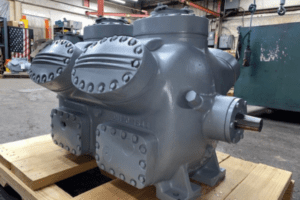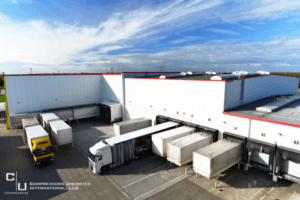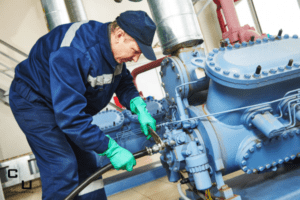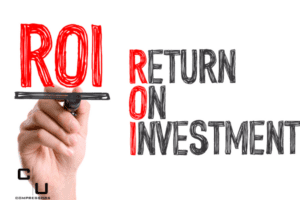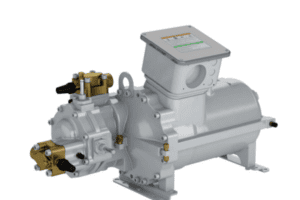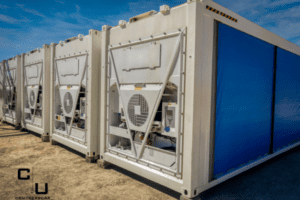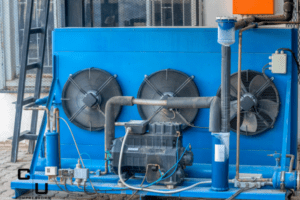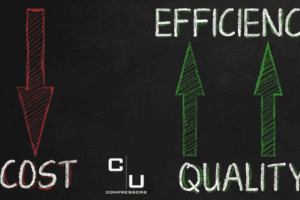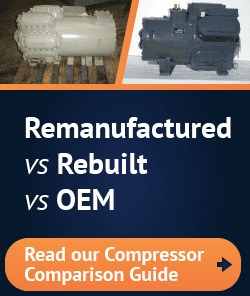Regular maintenance can help you keep your commercial HVAC unit operating at peak performance. One of the most important maintenance tasks is to routinely clean the entire system. Because a commercial HVAC unit is remarkably complex, maintenance operations are best left to an experienced commercial HVAC technician.
Determining the Need for HVAC System Cleaning
Prior to initiating any cleaning activities, the technician should asses and visually inspect the HVAC system in order to establish whether it should be cleaned. HVAC system cleaning should be performed if:
- system components show any signs of corrosion, rust, air leakage, moisture, and/or contamination;
- fungal, bacterial, or pest colonization is confirmed through specific analytical methods; if mold is detected, further assessment by an indoor environmental professional (IEP) may be required;
- the system releases visible particles of dust and/or dirt into the air or in the condensate drain pan;
- system performance inefficiencies (e.g. airflow degradation, system’s inability to maintain the indoor temperature according to the pre-set values, etc.) could be caused by dirt accumulation in different parts of the unit;
- the HVAC system cannot maintain good indoor air quality; regular activities in a commercial building generate different air pollutants and contaminants, which are pulled into the HVAC unit and re-circulated several times a day; over time, this recirculation causes contaminants to accumulate in the air ducts.
If the preliminary inspection reveals that your commercial facility could benefit from HVAC system cleaning, the technician will perform the activities described below.
Cleaning the Filters, Fans, and Vents
Filters, fans, and vents are vital components to maintaining indoor air quality. But a major problem with these components is that they tend to accumulate different airborne particles over time. Within several months, dirty and/or clogged filters, fans, and vents can affect indoor air quality and impede the airflow within the system.
Lower airflow rates will negatively impact the heat exchange properties of the condenser coil, which can no longer cool the refrigerant efficiently. Additionally, reduced airflow can cause the evaporator coil to freeze. As these factors can reduce the cooling capacity of the compressor, the unit will need to work harder in order to maintain the desired indoor temperature and humidity levels.
Furthermore, dirt buildup on filters, fans, and vents can create a favorable environment for fungal and bacterial growth and proliferation. If these non-visible airborne contaminants enter the HVAC system, they can be introduced into the indoor environment.
To prevent this from happening, specialists recommend cleaning the filters, fans, and vents of an HVAC unit twice a year, or more often if the commercial building is located in a humid climate or uses the system frequently.
Cleaning the Condenser Coil, Evaporator Coil, and Reheat Coil
Over time, dust, dirt, and other airborne particles will inevitably accumulate on the condenser, evaporator, and reheat coils. This will significantly affect their heat transfer rate along with the cooling and heating capacity of your HVAC system. In order to meet the cooling and heating demands of your facility, the unit will need to operate harder and/or for longer periods of time. This, in turn, will increase your energy bills, while reducing the service life of different HVAC components, including the compressor.
As the condenser, evaporator, and reheat coils are vital to the performance and lifespan of your HVAC system, keeping them clean is critically important. In a nutshell, clean coils will allow the air to pass through without restriction, facilitating maximum heat transfer. HVAC technicians use some simple pressure washing and/or steam cleaning techniques to ensure clean coils.
Cleaning the Air Ducts, Drain Lines, and Drain Pan
Sometimes, moisture can condense on your ductwork during the dehumidification process and/or due to temperature fluctuations. This can be a serious problem because it is very easy for contaminants to stick to your air ducts.
In a short amount of time, enough airborne particles can accumulate on your ductwork to affect indoor air quality, restrict the airflow, and negatively impact system performance. Because dirt buildup makes it more difficult for air to travel through your ductwork, your unit will consume more energy in order to cool or heat your commercial facility. Cleaning the air ducts can restore your HVAC system to peak operating efficiency and reestablish a healthy indoor environment.
A clogged condensate drain line and/or pan can also cause various problems, including water leaks, inefficient system operation, and unexpected shutdowns. Regularly cleaning the condensate drain line and pan can prevent all these issues and have a positive impact on the overall performance of your commercial HVAC system.According to experts, all these operations should be performed as part of a preventive HVAC maintenance program, in full compliance with industry-specific standards and protocols.

